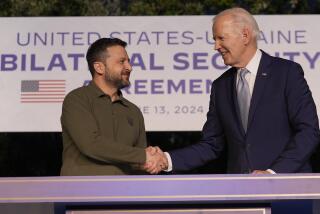U.S. Expects Agreement on Missiles : Shultz Says Lack of Summit Would Not Be Bar to Treaty
- Share via
BRUSSELS — Secretary of State George P. Shultz told NATO foreign ministers here Saturday that the United States fully expects to complete and sign an agreement with the Soviet Union this year to eliminate intermediate nuclear forces worldwide, whether or not there is a superpower summit in Washington.
Speaking at a news conference at North Atlantic Treaty Organization headquarters during a special stopover en route from Moscow to Washington, Shultz said, “There is no indication that this (lack of a summit) will hold things up on an INF agreement.”
He noted that Soviet Foreign Minister Eduard A. Shevardnadze had “given a similar answer” in Moscow and said that they both had agreed in their final talk “to keep up the pressure to get finished.”
To Explore Alternatives
“I think we will get an agreement and that we will want to get it signed,” Shultz said. “If not at a summit, then we will look for another way to do it. But it would be desirable to have it done in the presence of the leaders who are responsible.”
At the same time, Shultz brushed aside a proposal by Soviet leader Mikhail S. Gorbachev during their Friday meeting, and subsequently publicized by the news agency Tass, for an immediate moratorium from Nov. 1 on any further deployment, manufacture or development work on intermediate nuclear forces--all nuclear weapons with ranges between 300 and 3,000 miles.
“No fish is going to bite on that one,” Shultz said. “It would be very unwise for us to put the presumed treaty into effect before it is even finished or signed.”
Meeting in Brussels
Foreign ministers of all 16 members of NATO, except Greece and Turkey, flew to Brussels for the session with Shultz, which lasted about two hours. During the meeting and at his news conference, the secretary played down the refusal of Gorbachev to fix a date for a Washington meeting with President Reagan. The other foreign ministers were clearly in general agreement.
One minister said that things are now in a period of “active patience.”
British Foreign Secretary Geoffrey Howe said that “the ball is clearly in the Moscow court, and it is time for cool heads and steady nerves.” When Howe was asked if he thought that Gorbachev had made this move to add to pressure on President Reagan along with the American stock market crisis, the foreign secretary laughed and said, “Well, nobody in the room suggested that one.”
Shultz declined to speculate on the reasons for the Gorbachev move. He simply said that “conditions (in Moscow) were more favorable for a summit . . . than they were a month ago when the Soviet Union agreed to a summit--there is an open invitation and when he (Gorbachev) is ready to accept, we will be prepared to receive him, and I think I’ll leave it at that.”
The practical results of the Moscow meeting were considerable. Shultz told his news conference that a formula had now been agreed by both sides to cover the unilateral withdrawal and dismantling of 72 obsolete West German Pershing 1-A missiles, along with the American arsenals of Pershing 2 and cruise missiles. The West German weapons, owned by Bonn but carrying warheads controlled by the United States, had been a major sticking point with the Soviet Union.
Under the formula, which will take the form of an agreed statement of understanding between the United States and the Soviet Union but will not be part of the intermediate nuclear forces treaty, the West Germans will destroy their Pershings on a timetable similar to the withdrawal of the U.S. missiles, and the United States will then repossess the nuclear warheads and return them across the Atlantic for dismantling and destruction under the same verification and inspection procedures that will apply to all other weapons.
West German Foreign Minister Hans-Dietrich Genscher confirmed after the NATO meeting that this formula is entirely satisfactory to the Bonn government.
Also agreed in Moscow was the important timetable to phase out the reductions on both arsenals without giving any advantage to either side along the way. Shultz said that progress had also been made on inspection procedures, although the number of inspections and where they are to be permitted is still under discussion.
Shultz heatedly denied that any pressure had been put on President Reagan by either himself or chief arms negotiation adviser Paul H. Nitze on the question of agreeing with the Soviet Union on curtailment of the Strategic Defense Initiative program--the so-called Star Wars space-based missile defense system.
Shultz disclosed that he had talked with the President twice during the Moscow discussions and said that there “is simply no fact” in suggestions that, in those conversations, he was pressuring the President on the SDI question. Gorbachev refused to set a date for a summit meeting with Reagan in Washington after unexpectedly renewing, during his meeting with Shultz, the Kremlin’s demand that “Star Wars” research be sharply circumscribed.
More to Read
Sign up for Essential California
The most important California stories and recommendations in your inbox every morning.
You may occasionally receive promotional content from the Los Angeles Times.










